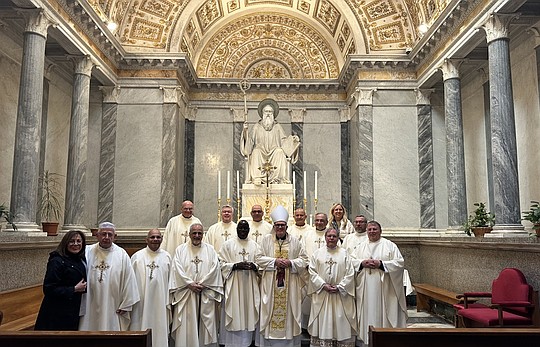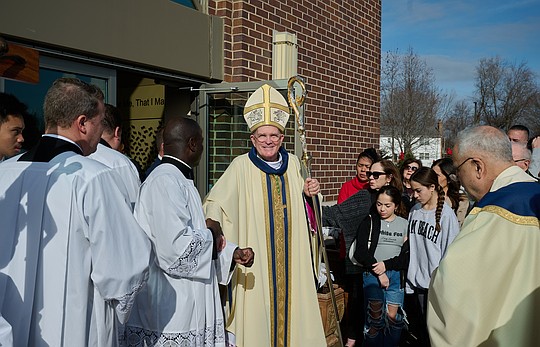As UN debates Mideast conflict, Israeli-Palestinian orchestra models peace in concert
February 24, 2023 at 9:01 p.m.

As they did so, an orchestra made up of eight musicians from either side of that Middle Eastern divide were in the same building Feb. 23, performing a classical musical concert for a selected audience.
The octet was part of the larger West-Eastern Divan Orchestra composed of young musicians from Israel, Palestine and other Arab countries that was founded in 1999 by renowned Israeli musician Daniel Barenboim and late Palestinian scholar Edward Said as an alternative way to address the decades-long Palestinian-Israeli divide.
"This is a great opportunity to have them visit the United Nations, perform and talk about their work and the work of the orchestra," explained Maher Nasser, of the U.N.'s Department of Global Communications, when asked by OSV News about why the group was invited to play that day at the U.N., where ways of ending the world's various other conflicts, including the war in Ukraine, were at the center of debate as well.
[[In-content Ad]]
"The United Nations was created as an organization that brings people together to promote the ideals of peace, human rights, development, and that we can overcome the differences by engaging with each other, not by fighting with one another," said Nasser, speaking on the sidelines of the concert, held in a U.N. chamber hall that was only about half full.
"And it is an opportune moment to also reflect on the role of culture, the role of music in bringing people together, bringing what unites us," Nasser said.
The orchestra played several works by the 19th-century German composer Felix Mendelssohn under the close supervision of the orchestra's manager, Tabaré Perlas.
Though this was the first time the orchestra had ever performed at U.N. headquarters in New York, Perlas told OSV News the musicians had played at other famous world venues before, including Castel Gandolfo in 2012, upon a personal invitation from Pope Benedict XVI, who "was very happy to receive the orchestra there, and for the orchestra it was very special."
The goal of the ethnically diverse West-Eastern Divan Orchestra then and now, Perlas noted, is "to bring a message to the world."
"Of course, the conflict in the Middle East will not be solved by an orchestra playing together but we are just a model and an example. That is what we try to be," he said.
An Israeli member of the orchestra who played the viola at the U.N. concert, Miriam Manasherov, agreed, saying, "I think we set an example for ourselves as human beings."
"I think the idea is … we are all equal, we are equal in music, we are equal in life, and the fact that we can manage on a daily basis and actually become very good friends as well, for us it's a victory," she told OSV.
Her fellow musician and orchestra member, Palestinian violinist Samir Obaido, stood nearby.
"Sometimes we get into this hopeless state where we think nothing can be done, so as an individual you feel like you have little effect on society," said Obaido, who played violin at the U.N. concert.
But he quickly added, "Music for me is definitely one of the last resorts that we can kind of go to in our world at the moment if we want more kindness and goodness."
James Martone writes for OSV News from New York.
Related Stories
Friday, January 02, 2026
E-Editions
Events
As they did so, an orchestra made up of eight musicians from either side of that Middle Eastern divide were in the same building Feb. 23, performing a classical musical concert for a selected audience.
The octet was part of the larger West-Eastern Divan Orchestra composed of young musicians from Israel, Palestine and other Arab countries that was founded in 1999 by renowned Israeli musician Daniel Barenboim and late Palestinian scholar Edward Said as an alternative way to address the decades-long Palestinian-Israeli divide.
"This is a great opportunity to have them visit the United Nations, perform and talk about their work and the work of the orchestra," explained Maher Nasser, of the U.N.'s Department of Global Communications, when asked by OSV News about why the group was invited to play that day at the U.N., where ways of ending the world's various other conflicts, including the war in Ukraine, were at the center of debate as well.
[[In-content Ad]]
"The United Nations was created as an organization that brings people together to promote the ideals of peace, human rights, development, and that we can overcome the differences by engaging with each other, not by fighting with one another," said Nasser, speaking on the sidelines of the concert, held in a U.N. chamber hall that was only about half full.
"And it is an opportune moment to also reflect on the role of culture, the role of music in bringing people together, bringing what unites us," Nasser said.
The orchestra played several works by the 19th-century German composer Felix Mendelssohn under the close supervision of the orchestra's manager, Tabaré Perlas.
Though this was the first time the orchestra had ever performed at U.N. headquarters in New York, Perlas told OSV News the musicians had played at other famous world venues before, including Castel Gandolfo in 2012, upon a personal invitation from Pope Benedict XVI, who "was very happy to receive the orchestra there, and for the orchestra it was very special."
The goal of the ethnically diverse West-Eastern Divan Orchestra then and now, Perlas noted, is "to bring a message to the world."
"Of course, the conflict in the Middle East will not be solved by an orchestra playing together but we are just a model and an example. That is what we try to be," he said.
An Israeli member of the orchestra who played the viola at the U.N. concert, Miriam Manasherov, agreed, saying, "I think we set an example for ourselves as human beings."
"I think the idea is … we are all equal, we are equal in music, we are equal in life, and the fact that we can manage on a daily basis and actually become very good friends as well, for us it's a victory," she told OSV.
Her fellow musician and orchestra member, Palestinian violinist Samir Obaido, stood nearby.
"Sometimes we get into this hopeless state where we think nothing can be done, so as an individual you feel like you have little effect on society," said Obaido, who played violin at the U.N. concert.
But he quickly added, "Music for me is definitely one of the last resorts that we can kind of go to in our world at the moment if we want more kindness and goodness."
James Martone writes for OSV News from New York.










